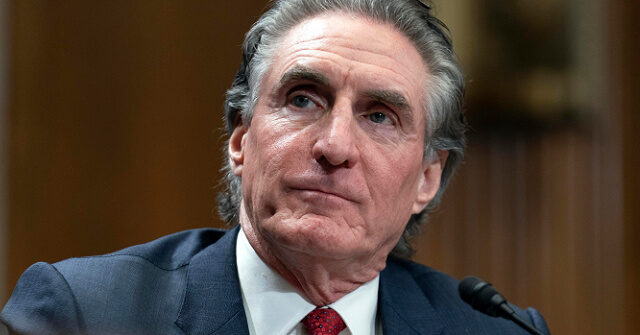Secretary of the Interior Doug Burgum explained in an interview on Wednesday that greatly expanding America’s share of the global energy market is part of President Donald Trump’s plan to increase world peace and limit the ability of malicious actors, including Russia, to cause mayhem.
Burgum made the comments in an interview on Fox News that aired on a particularly busy day for Trump’s policies regarding Russia’s ongoing invasion of Ukraine. Following a meeting in Saudi Arabia between Secretary of State Marco Rubio and several top Russian officials on Tuesday, Trump published a statement on Wednesday expressing disgust with Ukrainian President Volodymyr Zelensky and demanding he hold elections, which is illegal in Ukraine during wartime. The comments followed Zelensky accusing Trump of falling for alleged “disinformation” by attempting to broker an end to the Russian invasion directly.
The public tensions between the two leaders led to concerns that Trump would support lifting sanctions on Russia’s oil industry or pressuring Europe, heavily dependent on Russia for its fossil fuels, to do the same, though Rubio has ruled out any such sanctions relief in the near future.
Burgum, in his capacity as secretary of the interior, noted that American allies in Europe, as well as Asian countries such as India and Japan, would prefer buying fossil fuels from America but were often forced not to as a result of policies implemented under former President Joe Biden.
“National security means energy security,” Burgum told Fox News host Bret Baier, adding that Trump has “met with more foreign heads of state in a month than some presidents meet with in a year” and has prioritized selling American energy in those meetings. He identified meetings in Washington with Japanese Prime Minister Ishiba Shigeru and Indian Prime Minister Narendra Modi as especially fruitful.
“Both of those prime ministers expressed their dismay,” he explained. “Hey, we want to buy more energy from America, but the Biden admin had shut down LNG [liquified natural gas] exports, inexplicably, again, just hurting America, helping our adversaries.”
On the issue of Russia specifically, Burgum made the case that the invasion of Ukraine was lucrative for the country because it raised the price of fossil fuels and many of its clients had no readily available alternative sellers.
“Russia basically ran an operation for ten years convincing Germany – whether it’s through cyberoperations, misinformation – the Green Party in Germany,” Burgum explained, arguing that opposition to domestic energy development made Germany and much of Europe dependent on Russia.
“When Russia invaded Ukraine, they knew the price was going to go up,” Burgum explained.
With an influx of American oil and gas into the global market, he argued, countries with interests averse to America’s will struggle to keep profits high.
“If we get the price of oil down, that’s harder for Iran to fund terrorism, hard for Russia to fight a war,” he argued.
Trump is focusing, he added, on a plan to “sell energy to our friends and allies so they can stop buying from our adversaries.”
Burgum serves as both secretary of the interior and as the head of the National Energy Dominance Council, which Trump convened this month to “achieve energy dominance [globally] by improving the processes for permitting, production, generation, distribution, regulation, and transportation.” Burgum explained to Fox News that the council includes several cabinet members seeking ways to make it easier and cheaper for companies to produce more American energy, making gasoline and other fuels cheaper for Americans but also outcompeting adversaries such as Russia.
Direct energy competition with Russia is a core topic of interest in Ukraine peace talks, especially as mainstream media outlets fret that Trump may reduce sanctions on Russia. Secretary Rubio dismissed that possibility in the near future while talking to reporters after his meetings with Russian officials, however.
“Sanctions are all the result of this conflict. There are sanctions that were imposed as a result of this conflict,” Rubio said. “And so I would say to you that in order to bring an end to any conflict there has to be concessions made by all sides. We’re not going to predetermine what those are. We’re certainly not going to negotiate this today or in a press conference for that matter.”
“The European Union is going to have to be at the table at some point because they have sanctions as well that have been imposed,” he added.
Similarly giving little indication of the future of Russia sanctions, Treasury Secretary Scott Bessent, who recently met with Zelensky, told reporters this week that Trump could eliminate or increase sanctions on Russia, without indicating that one is more likely than the other at the moment.
Follow Frances Martel on Facebook and Twitter.
Read the full article here
